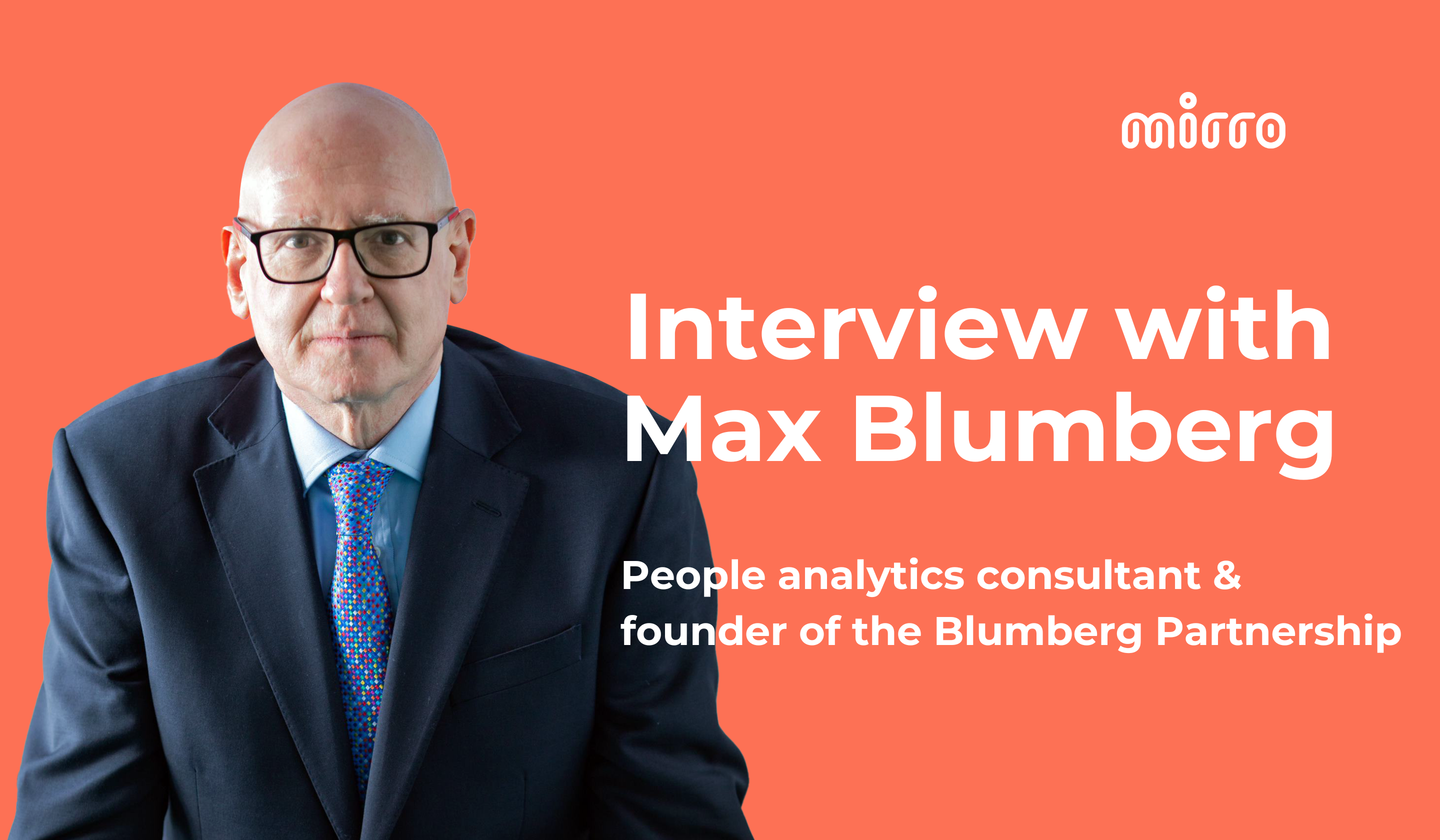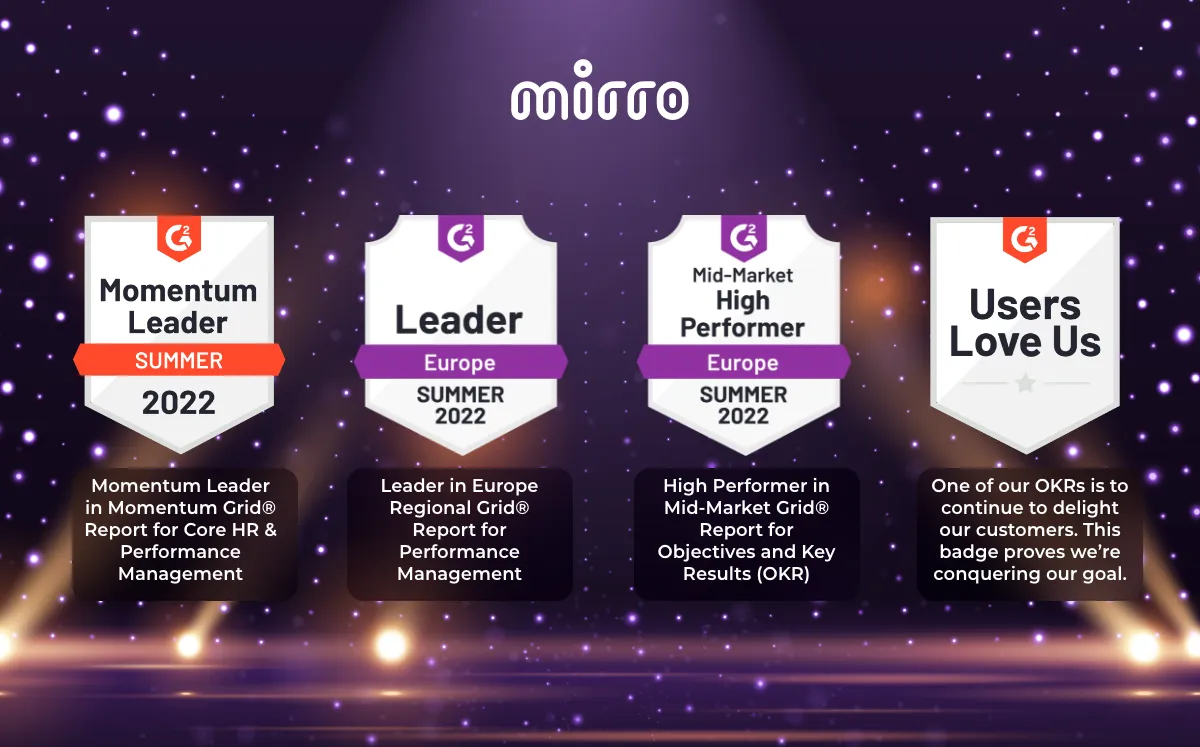SECTION
Max Blumberg, PhD, people analytics consultant: “The problem with people analytics is that it needs to learn how to measure the value of people”

Listen to this article:
In addressing myriad challenges associated with the modern workforce, people leaders find a crucial ally in people analytics. This field has evolved significantly, offering organizations profound insights into their most valuable asset – their people.
To understand today’s people analytics trends and their future evolution, we interviewed Dr. Max Blumberg, bringing over two decades of expertise to the forefront of our discussion. Max Blumberg founded the Blumberg Partnership, a Top 50 consultancy specializing in People Analytics. Max is also a Visiting Professor at Leeds University Business School and an Associate Researcher at the University of Southern California.
In this conversation, we aim to explore the multifaceted impact of people analytics on the employee-manager relationship, the role of companies in helping individuals achieve their aspirations, challenges, and contributions, and the importance of showing commercial value in people analytics projects. Let’s dive into Max’s insights and advice for the people leaders looking to implement a people analytics solution!
Having dedicated over two decades to studying Human Resources and People Analytics, what notable changes have you observed in this field up to this point? How would you advise companies to navigate them?
It's quite interesting. People Analytics started as more of an IT function rather than a business analytics function. It reports statistics and graphics, but it does not look at the impact of people on the business profitability, for example. And so you would have hoped by now that more companies have moved from just doing basic statistics to looking at the impact on profitability and the company. But that hasn't really happened much, which is very interesting.
In fact, this function has become even more IT-oriented. There are many technology vendors now, but they need to promote more sophisticated analytics or link them to the business because this is not the current business model. And so, to my mind, people analytics has not made the big move it needs to make.
A few companies try to make the commercial connection from people analytics to the bottom line and profitability. But that is mainly the consultancies and independent consultants like me; that is a central part of my work. Usually, when they see people analytics, they see data and graphs, visualization, basic tables, and so on instead of seeing fantastic connections to improve the business. I'm not saying it should always be about profit; happy employees are important. You can hypothesize that unhappy employees translate to lower profits in the company. Still, there must come a point where you make the employee happier and happier and happier. But at some point, happy, happy, happy, and then the profit will come down.
In your research in people analytics, what is the most common bottleneck you have observed in medium to large businesses?
Undoubtedly, it is the ability of people analytics to understand the business. HR people do not understand the company, but they understand talent management and technology. They did not initially understand technology, but all of these vendors have trained them. However, they cannot name the profitability or business problem we are trying to solve with people analytics. Because they do not go to school to learn that sort of thing. HR was never required to understand the business before, and they are still on a learning curve (which technology vendors are happy to fill).
We can discuss whether people analytics is part of HR. Or is it separate from HR? Or should it be separate from HR? But people analytics and HR people need to understand that it's about commercial value. And this message has not reached the CIPD or SHRM in a big way; when I was there, I started shifting it in that direction. So, I created the first people analytics training for the CIPD in 2004. And they did not like it when I was teaching the commercial aspects. They were not happy. They said, "Why are you teaching them money? We are about people."
Also, there’s this concept Dave Ulrich calls on the outside-in view of HR. What he means by outside-in is that the outside is the customer, and you must build your HR and culture around what the customer is looking for. So you need to know about the market, but HR people never visit the customer. And I do the same by the way, I never visit the customer. Only marketing and sales go outside the company and see what they are looking for. And that is something that holds HR back. The result of that, in terms of a bottleneck, is that today, CEOs and executive teams have a lot of choices. They don't have to use people to do work nowadays. If you want to get something done, you can outsource it. You can use robotics, you can use AI, it's the same.
In the next five to 10 years, there could be a complete loss of people analytics and HR, or they could wake up and start trying to demonstrate that people are more valuable than automation. But I cannot tell which way it is going to go. I think it will go towards automation, but that's my belief.
If it comes to this scenario, what should HR people and people analytics experts do?
First, you must show the commercial value of human beings (employees). You must have people analytics tools that can do this, and you need to learn proper statistical methods. That's one critical step. The other thing is that maybe people analytics should no longer be called people analytics. Perhaps it should be called production, analytics, or work analytics, not workforce analytics. If you have a job, you look for the best method to do your work. Is automation the solution? Or maybe Outsource? I think the answer to this question will still be human beings. So now the work analytics function clearly says we will get the best commercial benefit by using human beings. And if people analytics becomes work analytics, not workforce analytics, then it has a chance of surviving.
Do you think the importance of the people component in people analytics can be diminished by incorrect or insufficient use of data?
At the end of the day, I am a statistician. When I was young, and I started, I thought all the answers came from data and statistics. Now, I am learning that data does not contain the answers. So, I believe there is too much emphasis on data in organizations. That's one mistake people in analytics have made, and it has become this expression: data-driven organization.
Understanding people and their personalities is more important than quantitative data about when they come to work and how much work they do. You need to understand what motivates them, especially Gen Z, a generation far more driven by meaning at work. However, big companies do not help Gen Z find meaning in work or their full potential.
When companies do not help you achieve your full potential, whereas my generation can handle this because we want the money, I think younger generations will say money is necessary, but this is about more than money. I want you to help me become a complete and fulfilled human being as well. If companies want the best employees, they must start offering them ways to fulfill their potential. Otherwise, these people will go somewhere else. So, data is a small part of it.
How do organizations that use people analytics compare with those that do not?
So the current research, especially David Green's recent study, shows that there's not much difference. It's because companies using such solutions are not making money from doing people analytics. There is certainly no commercial difference in the organizations doing it because, as David says, most companies need to show commercial benefits. Not much work is being done to show the impact of people analytics on organizations.
Before we did a people analytics project, we measured the business impact of the people analytics work, but we were very unusual. Most companies do not do anything like this. They're not interested in measuring the benefit.
How do you effectively measure the ROI of people analytics initiatives?
The same way that you measure in IT. For any project, be it people analytics, finance, or manufacturing, it's all done similarly. The problem with people analytics is that it needs to learn how to measure the value of people. McKinsey suggested a very interesting measure. It is called employee lifetime value. However, nobody measures employee lifetime value or the cost of the employee in terms of salary, recruitment, and learning & development. Only after you measure all these you can work out the ROI. But no one is doing this.
Where should companies that want to implement people analytics projects start?
You must find out the business problem you're trying to solve. Now they say that all the time in people analytics. They've been saying that for 20 years since I started. Everything must be business-driven or business-problem-driven. In my work with BBC, for example, the outcome was clear: they wanted to improve innovation. Today, we are talking about the idea of data-driven. The problem with being data-driven rather than business-driven is that data-driven lets us take our database and analyze it to see if something useful falls out of it. If you start by looking at the data, you do not really know what you are looking for. In statistical terms, you are just looking for correlations. If you start by saying, "We have a problem with productivity; what are the factors causing our productivity to die?" it is far more useful. So, rather than being data-driven and starting with data, we begin with a business problem.
How can companies effectively ensure the confidentiality and privacy of employee data in people analytics projects?
The technical answer for that is that there are security protocols in IT, and people analytics is born from IT. So, if anybody can protect the data, it is people analytics.
What role do people analytics have in helping people managers lead better?
I think data is data can be used to help managers lead better, but it is not a replacement for managers. If data can automate the management process so managers have more relationship time with their employees, that's great. I did a project for a company that wanted me to design a retention or attrition system that could predict when an employee will leave. One executive said he already had a system for all European country managers. He met monthly with the country managers, and they had a spreadsheet with all the key employees they had to present. All of the key employees in the spreadsheet for each country were marked in red if they were at risk of leaving and in green if they were happy. And if an employee leaves the company, but the head of the country had that person marked with green because things were supposedly great, then that manager will get fired. If the manager had marked the person at risk (in red), and they left, it's okay.
He is basically saying that he wants to rely on something other than technology to tell him if somebody is going to leave. He says the manager should have a close relationship with employees rather than using people analytics to do the job. If you have $300,000 to spend on improving your workforce, should you spend that money on people analytics? Or should you spend that on giving your managers better management skills? I think the danger we're moving into is dehumanizing managers by relying too much on people analytics. Maybe we should spend 150 grand on people analytics and 150 grand on upskilling the managers with proper training so that they can have decent relationships with their employees. So, people analytics can help managers, but it should not replace the relationship of the manager with the employee.
How do you see the future of people analytics and its importance for modern workplaces?
Unless we can prove the value of human employees, companies will start using more outsourcing, AI, robotics, etc. And so, if there are fewer people, then there is less need for people analytics; you only need people analytics if there are many people. So, the future of people analytics, if it is going to survive at all, will need to prove that what it does improves the company's profitability. So, as David Green said, they are not proving this at all at the moment. Most projects have no commercial value, and if people analytics projects have no commercial value, then presumably, the people do not know if they have commercial value. People analytics has a big job in surviving and helping people prove their value. So my answer, if I were to take a guess, is that we are going to see a lot more AI doing the work in organizations and a lot fewer people.
Key takeaways
This discussion underscored the crucial need for organizations to embrace and demonstrate the commercial value of their people analytics initiatives actively. As businesses navigate the evolving landscape of workforce management, it's clear that leveraging data to enhance the employee experience is a complex but essential endeavor.
This interview merely scratched the surface of this compelling subject, leaving us with a wealth of insights to explore. In the coming weeks, we will delve deeper into people analytics and the HR world through a series of articles. Stay tuned as we unravel more layers of this fascinating and challenging intersection of technology, human resources, and organizational strategy.






